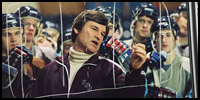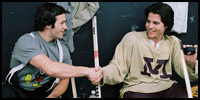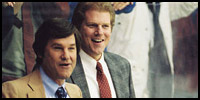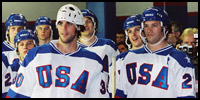
 |
|
Miracle (2004) Cast: Kurt Russell, Patricia Clarkson, Noah Emmerich, Eddie Cahill, Michael Mantenuto, Nathan West, Patrick O'Brien Demsey, Kenneth Mitchell, Nate Miller, Eric Peter-Kaiser, Bobby Hanson, Samuel Skoryna, Pete Duffy, Joe Cure, Stephen Kovalcik 2004 – 135 minutes Rated: Reviewed by Dustin Putman, February 7, 2004.  A hockey movie whose ending is not only foretold by the true story on which it is based, but also by its very title and the trailers, "Miracle" is well-made and all too predictable in equal measures. Directed by Gavin O'Connor (1999's "Tumbleweeds") with a keen eye for period detail, the film closely follows the formula of the sports genre while, nonetheless, offering a sincere look at a triumphant moment in American history. As such, it amicably gets the job done while never wavering far from its often cliched path.
A hockey movie whose ending is not only foretold by the true story on which it is based, but also by its very title and the trailers, "Miracle" is well-made and all too predictable in equal measures. Directed by Gavin O'Connor (1999's "Tumbleweeds") with a keen eye for period detail, the film closely follows the formula of the sports genre while, nonetheless, offering a sincere look at a triumphant moment in American history. As such, it amicably gets the job done while never wavering far from its often cliched path.
 "Miracle" chronicles the road Team USA takes in its preparation and ultimate defeat of the thought-to-be-unbeatable Soviet Union team during the 1980 Winter Olympics. Told from the point of view of the team's dedicated coach, Herb Brooks (Kurt Russell), Herb is married to the patient Patti (Patricia Clarkson) and has two young children. When he is hired as the coach, his lifelong dream finally reaches fruition. However, in 1980 the Soviet hockey team had won the gold at the Olympics every four years since 1960, and Herb faces an uphill battle in convincing his players that they are fully capable of upsetting the other country's winning streak.
"Miracle" chronicles the road Team USA takes in its preparation and ultimate defeat of the thought-to-be-unbeatable Soviet Union team during the 1980 Winter Olympics. Told from the point of view of the team's dedicated coach, Herb Brooks (Kurt Russell), Herb is married to the patient Patti (Patricia Clarkson) and has two young children. When he is hired as the coach, his lifelong dream finally reaches fruition. However, in 1980 the Soviet hockey team had won the gold at the Olympics every four years since 1960, and Herb faces an uphill battle in convincing his players that they are fully capable of upsetting the other country's winning streak.
 Written by Eric Guggenheim, "Miracle" opens with a beautifully realized montage of key late-1970s current events, setting up the time period and environment in which the picture is set, before settling into a more traditional telling of its stories. Nonetheless, other subtly powerful details of the era work their way in, giving the film an added texture it otherwise would not have had. One scene, for example, takes place as assistant coach Craig Patrick (Noah Emmerich) waits in a long line at a gas station, the result of gas shortage and huge prices. The production design, costumes, and hairstyles are also very clearly of the late-'70s/early-'80s period, while another scene is undercut by the use of Blue Oyster Cult's classic "Don't Fear the Reaper."
Written by Eric Guggenheim, "Miracle" opens with a beautifully realized montage of key late-1970s current events, setting up the time period and environment in which the picture is set, before settling into a more traditional telling of its stories. Nonetheless, other subtly powerful details of the era work their way in, giving the film an added texture it otherwise would not have had. One scene, for example, takes place as assistant coach Craig Patrick (Noah Emmerich) waits in a long line at a gas station, the result of gas shortage and huge prices. The production design, costumes, and hairstyles are also very clearly of the late-'70s/early-'80s period, while another scene is undercut by the use of Blue Oyster Cult's classic "Don't Fear the Reaper."
 The telling of the central plot is more by-the-numbers, switching between the team's strenuous training and Herb's relationship with wife Patti, who supports his dream even without fully understanding its meaning to him. Coming off a sterling year with "The Station Agent" and her Oscar-nominated performance for "Pieces of April," Patricia Clarkson breathes intimate life and an added layer of depth into the decidedly thankless part of Patti Brooks. While Clarkson has proven capable of more demanding roles, it is a strong step for her into more mainstream fare.
The telling of the central plot is more by-the-numbers, switching between the team's strenuous training and Herb's relationship with wife Patti, who supports his dream even without fully understanding its meaning to him. Coming off a sterling year with "The Station Agent" and her Oscar-nominated performance for "Pieces of April," Patricia Clarkson breathes intimate life and an added layer of depth into the decidedly thankless part of Patti Brooks. While Clarkson has proven capable of more demanding roles, it is a strong step for her into more mainstream fare.
 Less satisfactorily developed are the ambitious hockey players on Herb's team, who are either mere extras or given just one or two personal character traits. While this does not have a disastrous effect on the film as a whole, their defeat of the Soviets might have held more impact had we been able to individually identify with them. Still, the 20-minute climax detailing the Olympic game between the USA and Soviet Union is expertly edited, fast-paced, and garners a surprising amount of suspense considering the outcome is clearly obvious.
Less satisfactorily developed are the ambitious hockey players on Herb's team, who are either mere extras or given just one or two personal character traits. While this does not have a disastrous effect on the film as a whole, their defeat of the Soviets might have held more impact had we been able to individually identify with them. Still, the 20-minute climax detailing the Olympic game between the USA and Soviet Union is expertly edited, fast-paced, and garners a surprising amount of suspense considering the outcome is clearly obvious.
 The picture's most emotionally rewarding moment is a quiet one. Following the unexpected win and amidst the ear-rattling cheers of the U.S. crowd, Herb makes his way into the silence of the hallway under the stadium to comprehend for himself what he has just achieved. In portraying Herb Brooks, who tragically died in a car accident last year, Kurt Russell (2003's "Dark Blue") cements what should have been known all along: he is a stupendous actor, able to transform himself inside and out for every role he takes on.
The picture's most emotionally rewarding moment is a quiet one. Following the unexpected win and amidst the ear-rattling cheers of the U.S. crowd, Herb makes his way into the silence of the hallway under the stadium to comprehend for himself what he has just achieved. In portraying Herb Brooks, who tragically died in a car accident last year, Kurt Russell (2003's "Dark Blue") cements what should have been known all along: he is a stupendous actor, able to transform himself inside and out for every role he takes on.
 "Miracle" is a good motion picture, absorbingly told and engrossingly carried out by director Gavin O'Connor. It also could have been more, using its 135-minute running time to strengthen the supporting characters and offer a more in-depth background of Herb's own past. Aside from a sole comment made by Patti, who mentions that his coaching is a way of compensating for his own disappointments as a hockey player, little is every disclosed about this important time in Herb's life. The music score by Mark Isham (2003's "The Cooler") also goes so over-the-top in its faux-inspirational strings as to become almost inappropriate. It spells out what the audience should feel in a clumsy, overpowering manner, and, thus, lessens the real impact of some scenes, which would have been better without music. As flawed as these elements are, "Miracle" is a solid sports film, the type of worthwhile, feel-good effort that may just win over a wide audience.
"Miracle" is a good motion picture, absorbingly told and engrossingly carried out by director Gavin O'Connor. It also could have been more, using its 135-minute running time to strengthen the supporting characters and offer a more in-depth background of Herb's own past. Aside from a sole comment made by Patti, who mentions that his coaching is a way of compensating for his own disappointments as a hockey player, little is every disclosed about this important time in Herb's life. The music score by Mark Isham (2003's "The Cooler") also goes so over-the-top in its faux-inspirational strings as to become almost inappropriate. It spells out what the audience should feel in a clumsy, overpowering manner, and, thus, lessens the real impact of some scenes, which would have been better without music. As flawed as these elements are, "Miracle" is a solid sports film, the type of worthwhile, feel-good effort that may just win over a wide audience.
|
© 2004 by Dustin Putman |














